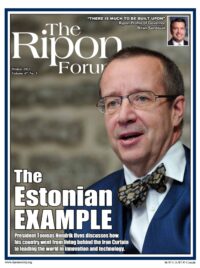
Relentless technological change is the fundamental fact of our time. Our smartphones today are more than a thousand times powerful and a million times less expensive than all the computers at MIT in 1965. This increase in computational power is both a boon and a danger to society. It creates innovation in all kinds of areas from energy to biotechnology because more and more technologies are brought into the domain of computation and then partake of its exponential progress. But technology also will create dangers both abroad with the rise of new weapons of mass destruction and at home as many jobs are replaced by machines.
As a result, the central problem of our time is how to adapt our democracy to the faster rate of technological change. Fortunately, the computational revolution also supplies new tools to allow government to make smarter decisions. The key is to use the power of our new information technology to better predict the consequences of policy. Republicans and Democrats disagree on policy, but they largely agree on some important goals, like increasing economic growth and improving education. Thus, an important bipartisan reform Republicans and Democrats can make is to create mechanisms and structures for generating more accurate information about policy results. There is widespread agreement that government should be focused on creating public goods like defense and pollution control that the market and family cannot provide. Information about the best policies is the master public good without which all other public goods cannot be well provided.
…the central problem of our time is how to adapt our democracy to the faster rate of technological change.
One important aspect of new technology is that it allows information to bubble up from more dispersed sources that are better filtered for accuracy. As a result, we can have expertise without being beholden to particular experts. For instance, information markets where citizens bet on policy results allow us to tap into the wisdom of crowds to determine which policies work. These markets have already showed great promise. On the day before the election the vote share market run by the University of Iowa foretold the vote shares of both President Obama and Governor Romney more accurately than the average of opinion polls on Real Clear Politics. The outcome should not surprise us: markets gather information effectively by encouraging people to put their money where their mouth is.
We could use these same markets to predict the results of policy as well. Markets can be made to compare the results of passing important legislation and failing to pass it, thus allowing us to better predict the effects of policy on such important factors as economic growth. Unfortunately, our laws make the effective operation of such markets in the United States impossible. Congress must legalize information markets with a bona fide public policy focus. It should then adopt rules that require that important legislation be made available on the web ten days before any vote. Markets can then be made on the legislation and experts can comment on the details through yet another new technology—blogs and social media.
Fortunately, the computational revolution also supplies new tools to allow government to make smarter decisions.
Government must also engage in fundamental restructuring to foster a more experimental politics that takes advantage of the big data generated by modern information technology. Congress should encourage agencies to do randomized experiments with regulation. For instance, if it is unclear whether a regulation will actually improve worker safely, an agency might apply it to some companies and not to others on a random basis and measure the results. It is not only the national government that can help create a more experimental democracy. States and local government can choose more decentralized and competitive systems like charter schools. When such schools try different policies, we can then better figure out which programs improve learning, particularly if government provides the funding for such studies.
The government should also fund research and development projects to improve policy analysis. The President’s proposal in the State of the Union to build a map of the human brain is one such initiative, because it will speed the development of artificial intelligence. As artificial intelligence becomes stronger, its algorithms will find patterns in events that now escape human understanding. AI enables us to build more accurate models to foretell future dangers and identify the policies that may forestall them.
Today, our government must use our ever better set of tools to improve governance and thus create a more prosperous, stable, and secure society. Technological acceleration simultaneously creates a greater capacity for the polity to revise policy on the basis of good information, and a greater need for modernization to navigate the rapids of social transformation. A society’s capacity for learning must match its capacity for change.
John O. McGinnis is a law professor at Northwestern University and author of the new book, Accelerating Democracy: Transforming Governance through Technology (Princeton University Press).




